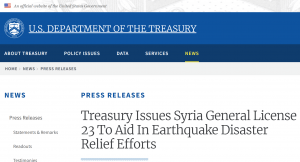Breaking: Finally, U.S. half listens to International Communities’ Cries to Lift Inhumane Syria Sanctions | Treasury Issues Syria General License 23 To Aid In Earthquake Disaster Relief Efforts for 180 days.
WASHINGTON – February 9, 2023 – Today, Treasury’s Office of Foreign Assets Control (OFAC) issued Syria General License (GL) 23, which authorizes for 180 days all transactions related to earthquake relief that would be otherwise prohibited by the Syrian Sanctions Regulations (SySR).
“Our deepest condolences go out to the people of Türkiye and Syria for the tragic loss of life and destruction in the wake of devastating earthquakes,” said Deputy Secretary of the Treasury Wally Adeyemo. “As international allies and humanitarian partners mobilize to help those affected, I want to make very clear that U.S. sanctions in Syria will not stand in the way of life-saving efforts for the Syrian people. While U.S. sanctions programs already contain robust exemptions for humanitarian efforts, today Treasury is issuing a blanket General License to authorize earthquake relief efforts so that those providing assistance can focus on what’s needed most: saving lives and rebuilding.”
U.S. sanctions programs do not target legitimate humanitarian assistance, including earthquake disaster relief efforts. The U.S. government has long had several general licenses in place under the SySR that permit most activities in support of humanitarian assistance, including in regime-held areas, by the United Nations, the U.S. government, or nongovernmental organizations (NGOs) engaging in transactions in support of certain not-for-profit activities. This new authorization expands upon these broad humanitarian authorizations already in effect under the SySR for NGOs, international organizations (IOs), and the U.S. government. This GL reflects the United States’ commitment to support the people of Syria through their ongoing earthquake crisis. While sanctions relief alone cannot reverse longstanding structural challenges and the brutal tactics of the Assad regime, it can ensure that sanctions do not inhibit the life-saving assistance needed following this disaster.
OFAC’s GL 23 provides the broad authorization necessary to support immediate disaster relief efforts in Syria. The Department of the Treasury will continue to monitor the situation in Syria and engage with key humanitarian and disaster assistance stakeholders, including NGOs, IOs, and key partners and allies, to understand emerging challenges they may face in delivery of services. U.S. and intermediary financial institutions should have what they need in GL23 to immediately process all earthquake relief transactions. If persons, including financial institutions, are engaged in disaster relief activities for Syria, but they believe their activities are not covered by existing authorizations or exemptions, those persons are encouraged to contact OFAC directly to seek specific licenses or guidance at OFAC_feedback@treasury.gov or by calling +1 202-622-2480. OFAC will prioritize any such requests.

